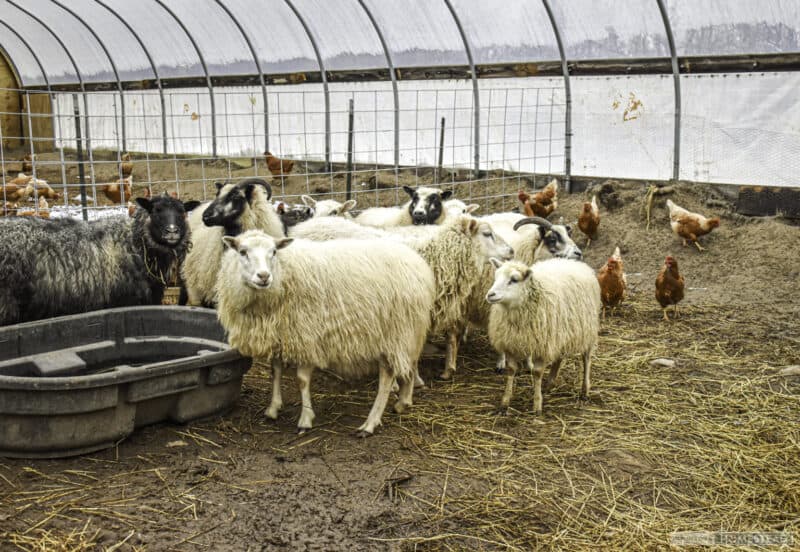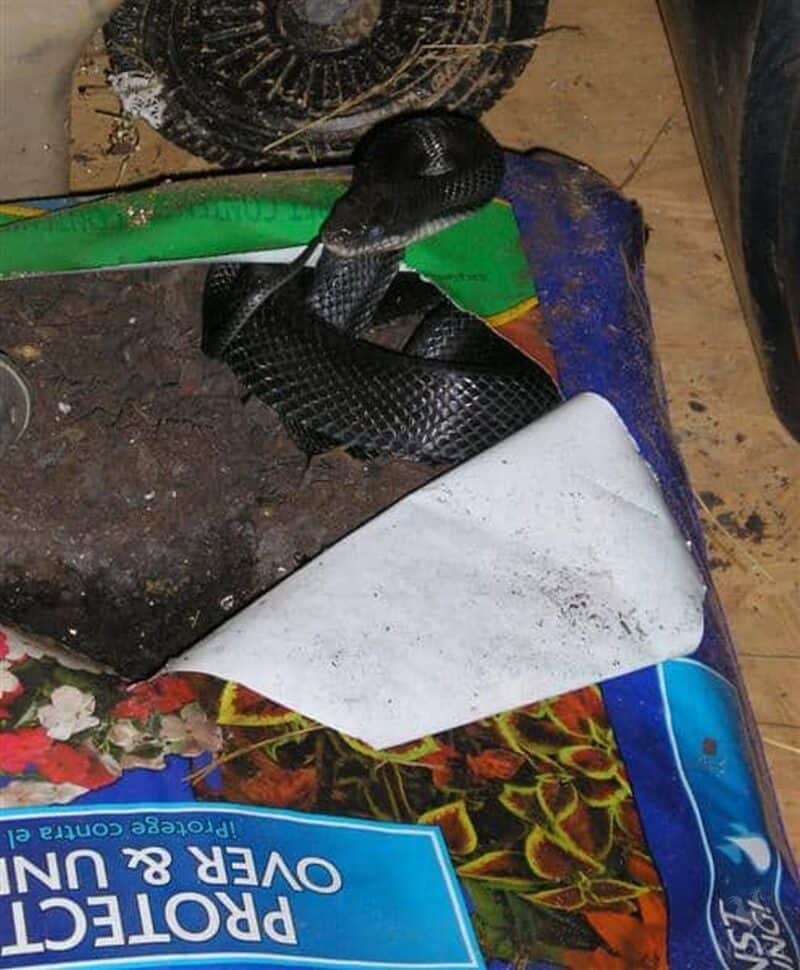If you own livestock, you already know that one of the biggest threats any of your animals can face is a close encounter with a venomous snake.

Although most animals instinctively retreat from snakes, so much of the time they won’t know it is there until it is too late.
A bite from any venomous reptile can you usually lead to maiming if it doesn’t cause death outright, and in the end most animals must be put down.
But, some people say that sheep do not need to fear venomous snakes because they are, supposedly, naturally immune.
What’s the deal? Are your sheep actually immune to snake venom?
Most breeds of sheep, but not all, are immune or extremely resistant to pit viper venom and the antibodies they produce are used in the production of antivenin. However, sheep may still be vulnerable to venoms from other kinds of snake.
This fact about sheep is one of those things that sounds so outrageous it must be an urban legend, but it is actually true.
Most breeds of sheep tend to be highly resistant to pit viper venom, such as that from rattlesnakes, thanks to specially adapted immune system responses.
That being said, any bite from a venomous snake can still prove to be a significant medical emergency for your sheep, and you must take it seriously.
Keep reading and I’ll tell you a lot more about this fascinating topic.
Bottom Line Up Front: You Cannot Assume Your Sheep Are Immune to Snake Bites!
Listen to me: Do not assume your sheep have nothing to fear from venomous snakes!
Despite a marked resistance and, in some cases, immunity to pit viper venom, the reality is that there are many kinds of venomous snakes and several kinds of unique venom among them.
Sheep might, or might not, be immune to any given snake venom and if not the consequences can be severe.
Accordingly it is always important to take preventative measures and be prepared for potential snake bites.

Many Sheep Do Show Resistance to Pit Viper Venom
But, to be perfectly clear, it is true that some sheep breeds show marked resistance to pit viper venom, thanks to a genetic adaptation that allows them to rapidly break down the venom in their body.
This resistance has been documented domestically in several breeds of sheep, including the Gulf Coast Native, St. Croix, and Katahdin and in many other kinds of sheep elsewhere around the globe.
While this resistance can provide significant protection against certain types of venom common to pit vipers, it is not foolproof and not universal across all species of venomous snake.
Your sheep should still be monitored carefully for signs of snake bites and treated promptly if they are bitten.
Not All Snakes are Pit Vipers, Though
It is important to point out that not all venomous snakes are pit vipers, and furthermore that venomous snake species don’t share some universal, generic snake venom. Hardly!
There’s vast and deadly variety to the deadly cocktails produced by these terrifying reptiles.
Among snakes, there are two basic types of venom, each distinguished by the dreadful effects it has on the unfortunate recipient of the snake’s wrath: They are neurotoxins and hemotoxins.
Neurotoxins affect the nervous system, while hemotoxins affect the circulatory system. Both can be more or less lethal depending on the specific enzyme composition, but all are terrible.
Most pit vipers use hemotoxic venom, and this is what most of the research into sheep immunity has been based on. This means your sheep may be in serious trouble if bitten by a snake with neurotoxic venom.
Even Among Pit Vipers, Venom Composition Varies
Even among pit vipers, the composition of venom can vary significantly. This means that resistance to one type of pit viper venom does not necessarily mean the same level of resistance to all types in individual sheep or specific breeds.
Some breeds of sheep may be more resistant to certain “formulations” of pit viper venom than others, again depending on the specific components of the venom.
This is why it’s so important for you to understand the types of snakes in your area, and very especially to become familiar with ones you have actually caught on your property.
That way you can familiarize yourself with the composition of their venom. This knowledge may save your sheep if it is ever bitten.
Can an Affected Sheep Survive a Snake Bite?
Yes, generally, especially if the sheep in question is highly resistant to the venom.
The survival rate of a sheep that have been bitten by a snake still depends on several factors, including the type of snake, the amount of venom injected, and the size and overall health of the animal.
In all cases, if a bite where envenomation occurs is untreated, the chances of survival decrease.
I should also point out that even if a sheep survives a snake bite, there may be long-term consequences, such as tissue damage at the site of the bite or other health issues.
What are the Consequences of a Snake Bite for Sheep?
The consequences of any venomous snake bite on a sheep can be severe.
Depending on the type of snake and the amount of venom injected, a bite can cause localized or systemic damage to tissues, the nervous system, cause respiratory distress, and even death outright.
And it’s a good idea for you to learn how to identify a snake bite.
Inspect the sheep for swelling at the site of the bite (with two bloody puncture wounds at the center), progression of swelling up the leg or body, and negative changes in behavior. In severe cases, the sheep may collapse and become totally unresponsive.
If you see any signs of a bite, even if you don’t suspect envenomation, take action!
Even in Cases of Resistance, Complications Can Be Serious or Fatal
Even if your sheep has some resistance to the snake venom it was injected with, complications from the bite can still be severe or fatal.
For example, the breakdown of venom by the animal’s body may take some time, allowing the toxins to spread and cause damage.
The bite might become infected by entirely mundane germs which could cause major illness, or even something really horrible like encephalitis.
This is why I was urging you to always, always, always take action and seek medical attention for any sheep bitten by any known venomous snake bite; the snake venom might not be the major worry!
What To Do if Your Sheep Is Bitten by a Snake
If your sheep is bitten by a snake, act fast and take appropriate action! The first step is to cautiously investigate the area to make sure the snake is gone or dead.
Then, remove the animal from the area to a more comfortable place. If you can, seek veterinary care immediately.
Antivenin should be administered immediately by you, if you have it and know the snake, or by the vet as quickly as possible.
Keep the sheep as calm and quiet as possible, as increased activity can cause the venom to spread more quickly.
If the bite is on one of the animal’s extremities, it may be helpful to loosely bandage the bite site to help prevent infection.
Does Sheep Blood Make Anti-venom?
Yes, it does! Sheep blood has long been used to produce antivenin, a substance called CroFab, for snake bites in humans.
This is because the immune system of sheep produces the antibodies that can neutralize snake venom directly.
Typically, sheep chosen for these production runs are slowly dosed with ever-increasing doses of snake venom to promote their bodies to produce more and more antibodies.
Eventually, these sheep usually wind up completely immune to the venom!
In the end, these antibodies are harvested from the sheep’s blood as serum and purified to create antivenin.
Tom has lived and worked on farms and homesteads from the Carolinas to Kentucky and beyond. He is passionate about helping people prepare for tough times by embracing lifestyles of self-sufficiency.

Great article but not sure I understand why you could not be more aware of where your sheep go. Would have been protective of them. Why did the sheep have to go 2 days of pain. Understand the use of this as an illustration. I would rather think of it as an example rather than glorify the example .